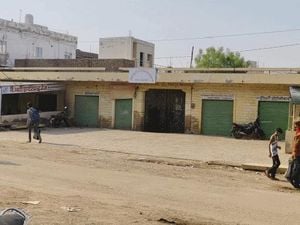PARK CITY, Utah (AP) — The 2025 Sundance Film Festival is drawing to a close, and what has surfaced is not just the triumphs and tribulations of independent filmmakers, but the looming question of its future location. For 41 years, this prestigious festival has found its home among the snowy peaks and charming streets of Park City, Utah, but as it prepares to explore new venues starting in 2027, the conversation among attendees is alive and buzzing.
The festival has become too large for its original ski town setting, and as thousands of attendees affixed bright yellow stickers reading "Keep Sundance in Utah" on their coats, the debate heated up. Governor Spencer Cox stated he would not outbid competing states for the festival, yet his office is advocating for $3 million to be allocated for Sundance's budget, emphasizing, "Sundance is Utah, and Utah is Sundance. You can’t really separate those two." An economic impact report from last year estimated the festival generated about $132 million for the state and created around 1,730 jobs—figures solidifying its importance.
Discussions of potential new homes for Sundance—Salt Lake City, Boulder, Colorado, and Cincinnati, Ohio—have sparked widespread speculation. "What does Sundance look like outside of Utah?" attendees ponder, as the final decision is expected by spring. The mood among festival veterans and locals teeters between hope and hesitation, as many wonder if the festival can maintain its identity and spirit if it relocates.
For some, the thought of moving Sundance from Park City is downright heartbreaking. Festival-goers like Dr. Rhonda Taubin, who relocated to Heber City partly due to her fond memories of Sundance, emphasized the communal experience it fosters. "We share conversations about provocative topics—losing Sundance would be such a loss for the community," Taubin said.
Concerns also echoed from local businesses. Restaurant owner Meagan Nash described Sundance as integral to her livelihood, generating significant revenue during typically slow months. “Sundance has been here my whole entire life,” Nash lamented. Conversely, some business owners, like Blaire Isleib, voiced mixed feelings, claiming the festival had diminished its retail opportunities amid the influx of non-local shoppers and delivery trucks.
While the festival showcased some remarkable films, many noted this year’s edition lacked the star power typically associated with Sundance. With smaller films from first-time directors at the forefront, industry veterans are asking whether it’s time for Sundance to reinvent itself. The subdued atmosphere, coupled with lower production rates within the film industry, suggests filmmakers may outgrow the festival.
This year, films like Hailey Gates’ satirical take on war, "Atropia," and Eva Victor's earnest exploration of trauma, "Sorry, Baby," showcased the talent present but also reflected the shift away from big names. An overall sense of uncertainty permeated the festival, with attendees questioning if relocating could inject new life or spell disaster for Sundance's iconic status.
Filmmakers like Tessa Thompson, who serves on the Sundance Institute’s board, believe the spirit of the festival is what truly matters, irrespective of location. "Sundance has more to do with the spirit and community, and I think that's evergreen. Regardless of where Sundance is, Sundance will always be," Thompson suggested.
The festival’s continued consideration of its future speaks to broader societal shifts, especially following significant political developments. Several documentaries centered around contemporary issues, from transgender rights to prison reform, highlighted Sundance’s mission to amplify diverse voices, even as the cultural climate remains fraught with challenges.
The overarching conversation, as Sundance concludes this year’s festivities, is clear: Where the festival will go next remains uncertain, but what is evident is its undeniable impact on film culture, community, and economic vitality. The question lingers: will Sundance lose its essence if it moves from the beloved slopes and streets of Park City? Only time will reveal how this iconic festival will adapt to the changing winds of the film industry.



